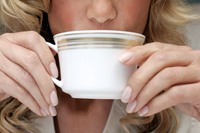Study shows drinking tea is good for you

Drinking tea is just as good as water when it comes to keeping the body hydrated, an important new clinical study commissioned by the Tea Advisory Panel (TAP), has found.
Four mugs of tea a day were found to be just as hydrating as water – with no negative effects.
It’s a common misconception that drinking caffeinated drinks, such as tea, coffee or cola, can dehydrate the body, depriving it of vital water necessary for good mental and physical health. It is thought that caffeine in drinks increases the frequency of urination, causing the body to lose too much water. While studies on caffeine pills have produced inconsistent results due to differences in caffeine levels, the small amount of research on caffeinated drinks has found no significant impact on hydration levels.
Until now, there has been only one study of tea drinking and hydration which was carried out at Everest Base Camp to assess the impact of four mugs of regular tea – also known as black tea – on hydration levels by measuring recognised markers in blood and urine.
In the new UK study, a total of 21 volunteers drank either four mugs of tea with milk (240ml) over a 12-hour period – equivalent to just under one litre of tea in total – or a similar amount of plain, warm water. Four cups of tea was chosen because this is slightly above the average daily tea intake in the UK. The all-male volunteer group had an average age of 36 years and none had habitually high caffeine intakes. The study was a cross-over trial so each male was exposed to both tea and water, although on separate days. A controlled diet was given during the test days and vigorous exercise, caffeinated products and alcohol were banned the day before each test.
Blood samples were taken before drink consumption and then at 1, 2, 4, 8 and 12 hours during the test days to check levels of electrolytes, total protein, urea, creatinine and osmolality – all recognised markers of body hydration. Urine was collected over 24 hours to gauge total volume and to check levels of creatinine, osmolality and electrolyte concentration – again common markers of hydration.
Following detailed analysis by a qualified statistician, no significant differences were found between the tea and water conditions. Drinking four mugs of tea over one day was found to be equally hydrating to drinking the same level of water. The researchers concluded that tea can make a valid contribution to daily fluid requirements.
Dr Carrie Ruxton, author of the clinical study notes: “It’s a common misconception that drinking tea can increase the risk of dehydration because of the caffeine content. But this new study proves that there is absolutely no truth behind the theory. Drinking moderate amounts of tea – four mugs a day – offered the same excellent hydration qualities as plain water. There were no statistical differences between regular tea and water when a wide range of blood and urine markers for hydration were tested among the volunteers. In addition, urine volume was similar after tea or water, confirming that we do not urinate more after drinking tea.
“This study shows that tea is an excellent way to keep hydration levels topped up throughout the day. Not only is a mug of tea refreshing and delicious, it can be an important part of maintaining proper hydration.”
Dr Catherine Hood from TAP adds: “It’s vital that everyone keeps their fluid levels topped up to avoid dehydration - proper hydration is key to good mental and physical health. Tea drinkers can be reassured that their favourite cuppa can count towards their fluid intake without the risk of dehydration.
“A growing number of scientific studies have demonstrated just how useful tea can be in keeping the body in good condition thanks to its high polyphenol content which gives tea its characteristic colour. Tea polyphenols not only have antioxidant effects but help maintain normal vascular function. This is why many studies have linked regular tea consumption with a lower risk of heart disease and stroke.
“There has been some debate over whether tea retains its healthy properties if drunk with milk, but again studies have shown that the positive effects of tea are just the same whether or not milk is used.
“The findings of this latest research agree with previous studies on caffeine pills and normal caffeinated drinks which demonstrated no adverse effects on hydration when a moderate caffeine intake (114-420mg/d) is consumed. Caffeine levels were not measured in the current study but would have been in the region of 200mg per day”.
The Tea Advisory Panel is supported by an unrestricted educational grant from the UK Tea Council, the trade association for the UK tea industry. The Panel has been created to provide media with impartial information regarding the health benefits of tea. Panel members include nutritionists, dieticians and doctors.

